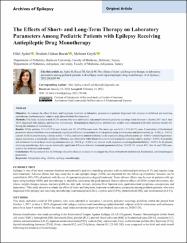| dc.contributor.author | Aydın, Hilal | |
| dc.contributor.author | Bucak, İbrahim Hakan | |
| dc.contributor.author | Geyik, Mehmet | |
| dc.date.accessioned | 2023-10-23T10:48:46Z | |
| dc.date.available | 2023-10-23T10:48:46Z | |
| dc.date.issued | 2022 | en_US |
| dc.identifier.issn | 2792-0550 | |
| dc.identifier.uri | https://doi.org/10.54614/ArchEpilepsy.2022.220306 | |
| dc.identifier.uri | https://hdl.handle.net/20.500.12462/13577 | |
| dc.description | Aydın, Hilal (Balikesir Author) | en_US |
| dc.description.abstract | Objective: To evaluate the effect of short- and long-term treatment on laboratory parameters in patients diagnosed with epilepsy in childhood and receiving monotherapy (carbamazepine, valproic acid, phenobarbital, levetiracetam).
Methods: This study included a total of 258 patients who were admitted to Adiyaman University pediatric neurology clinic between 1 October 2017 and 1 June 2019, diagnosed with epilepsy, and received monotherapy. Hematological, biochemical, and hormonal profiles were compared in the third and nine months following the initiation of monotherapy.
Results: Of the patients, 115 (44.57%) were female and 143 (55.43%) were male. The mean age was 8.33 +/- 3.51 (0-17) years. Examination of biochemical parameters showed that there was a statistically significant difference in creatinine levels in patients using levetiracetam and phenobarbital (p = 0.009, p = 0.031); calcium levels in patients using valproic acid (p = 0.002); and alanine aminotransferase levels in patients using carbamazepine (p = 0.045). Considering hematological parameters, a statistically significant difference was observed in white blood cell count levels in patients receiving valproic acid (p = 0.005); hemoglobin and hematocrit levels in those receiving carbamazepine (p = 0.010, p = 0.042); and platelet levels in patients receiving phenobarbital (p = 0.037). In all patients receiving monotherapy, there was no statistically significant difference between hormonal parameters (folate, 25-OH D3, vitamin B12, free t4, and TSH) measured in the third and ninth months.
Conclusions: We recommend that AED therapy should be checked routinely to investigate the effects of treatment on hormonal, biochemical, and hematological parameters. | en_US |
| dc.language.iso | eng | en_US |
| dc.publisher | Galenos Publ House | en_US |
| dc.relation.isversionof | 10.54614/ArchEpilepsy.2022.220306 | en_US |
| dc.rights | info:eu-repo/semantics/openAccess | en_US |
| dc.rights | Attribution-NonCommercial-NoDerivs 3.0 United States | * |
| dc.rights.uri | http://creativecommons.org/licenses/by-nc-nd/3.0/us/ | * |
| dc.subject | Antiepileptic Drug | en_US |
| dc.subject | Children | en_US |
| dc.subject | Epilepsy | en_US |
| dc.subject | Monotheraphy | en_US |
| dc.title | The effects of short- and long-term therapy on laboratory parameters among pediatric patients with epilepsy receiving antiepileptic drug monotherapy | en_US |
| dc.type | article | en_US |
| dc.relation.journal | Archives of Epilepsy | en_US |
| dc.contributor.department | Tıp Fakültesi | en_US |
| dc.contributor.authorID | 0000-0002-2448-1270 | en_US |
| dc.identifier.volume | 28 | en_US |
| dc.identifier.issue | 2 | en_US |
| dc.identifier.startpage | 89 | en_US |
| dc.identifier.endpage | 94 | en_US |
| dc.relation.publicationcategory | Makale - Uluslararası Hakemli Dergi - Kurum Öğretim Elemanı | en_US |




















